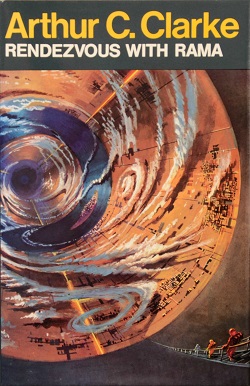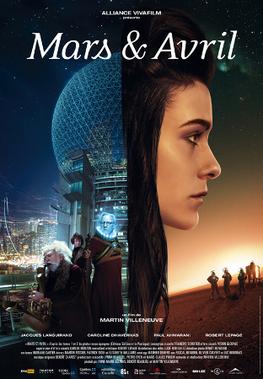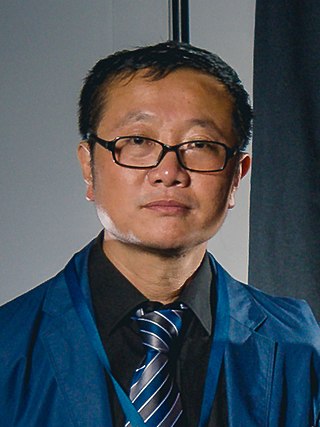
Rendezvous with Rama is a science fiction novel by British writer Arthur C. Clarke first published in 1973. Set in the 2130s, the story involves a 50-by-20-kilometre cylindrical alien starship that enters the Solar System. The story is told from the point of view of a group of human explorers who intercept the ship in an attempt to unlock its mysteries. The novel won both the Hugo and Nebula awards upon its release, and is regarded as one of the cornerstones in Clarke's bibliography. The concept was later extended with several sequels, written by Clarke and Gentry Lee.

Science fiction is a genre of speculative fiction, which typically deals with imaginative and futuristic concepts such as advanced science and technology, space exploration, time travel, parallel universes, and extraterrestrial life. Science fiction can trace its roots to ancient mythology. It is related to fantasy, horror, and superhero fiction and contains many subgenres. Its exact definition has long been disputed among authors, critics, scholars, and readers.

China Tom Miéville is a British speculative fiction writer and literary critic. He often describes his work as weird fiction and is allied to the loosely associated movement of writers called New Weird.

The Arthur C. Clarke Award is a British award given for the best science fiction novel first published in the United Kingdom during the previous year. It is named after British author Arthur C. Clarke, who gave a grant to establish the award in 1987. The book is chosen by a panel of judges from the British Science Fiction Association, the Science Fiction Foundation, and a third organisation, which as of 2019 is the Sci-Fi-London film festival. The award has been described as "the UK's most prestigious science fiction prize".

Richard Kingsley Morgan, is a British science fiction and fantasy author of books, short stories, and graphic novels. He is the winner of the Philip K. Dick Award for his 2003 book Altered Carbon, which was adapted into a Netflix series released in 2018. His third book, Market Forces, won the John W. Campbell Award in 2005, while his 2008 work Thirteen garnered him the Arthur C. Clarke Award.

Denis Villeneuve is a Canadian filmmaker. He is a four-time recipient of the Canadian Screen Award for Best Direction, winning for Maelström in 2001, Polytechnique in 2009, Incendies in 2010 and Enemy in 2013. The first three of these films also won the Canadian Screen Award for Best Motion Picture, while the latter was awarded the prize for best Canadian film of the year by the Toronto Film Critics Association.

My 20th Century is a 1989 Hungarian comedy-drama science fiction film written and directed by Ildikó Enyedi. It premiered at the Toronto Festival of Festivals. Enyedi won the Golden Camera award at the 1989 Cannes Film Festival. The film was selected as the Hungarian entry for the Best Foreign Language Film at the 62nd Academy Awards, but was not accepted as a nominee. The film was chosen to be part of the New Budapest Twelve, a list of Hungarian films considered the best in 2000.
The genre of science fiction has been prevalent in the Indian film industry since the second half of the 20th century. Beginning in 1952, the Tamil film Kaadu was made, which was an Indian-American co-production. The 1963 Tamil film Kalai Arasi, 1965 Telugu film Dorikithe Dongalu, and 1967 Hindi film Chand Par Chadayee also have science fiction in their storyline. The Alien was a science fiction film under production in the late 1960s which was eventually cancelled. The film was being directed by Bengali Indian director Satyajit Ray and produced by Hollywood studio Columbia Pictures. The script was written by Ray in 1967, based on "Bankubabur Bandhu", a Bengali story he had written in 1962 for Sandesh, the Ray family magazine.

Sir Arthur Charles Clarke was an English science fiction writer, science writer, futurist, inventor, undersea explorer, and television series host.

Moon is a 2009 science fiction film directed by Duncan Jones and written by Nathan Parker from a story by Jones. The film follows Sam Bell, a man who experiences a personal crisis as he nears the end of a three-year solitary stint mining helium-3 on the far side of the Moon. Kevin Spacey voices Sam's robot companion, GERTY. Moon premiered at the 2009 Sundance Film Festival and was released in selected cinemas in New York and Los Angeles on 12 June 2009. The release was expanded to additional theatres in the United States on 10 July and to the United Kingdom on 17 July. A follow-up film containing an epilogue to the film's events, Mute, was released in 2018. A third installment, a graphic novel called Madi: Once Upon A Time in the Future, was released in 2020.

2001: A Space Odyssey is a 1968 epic science fiction film produced and directed by Stanley Kubrick. The screenplay was written by Kubrick and science fiction author Arthur C. Clarke, and was inspired by Clarke's 1951 short story "The Sentinel" and other short stories by Clarke. Clarke also published a novelisation of the film, in part written concurrently with the screenplay, after the film's release. The film stars Keir Dullea, Gary Lockwood, William Sylvester, and Douglas Rain and follows a voyage by astronauts, scientists, and the sentient supercomputer HAL to Jupiter to investigate an alien monolith.

Mars & Avril is a 2012 Canadian science fiction film starring Jacques Languirand, Caroline Dhavernas, Paul Ahmarani and Robert Lepage. The movie, based on the photo-novels of the same name published by Sid Lee & la Pastèque, is written, produced and directed by Martin Villeneuve.

Liu Cixin is a Chinese computer engineer and science fiction writer. He is a nine-time winner of China's Galaxy Award and has also received the 2015 Hugo Award for his novel The Three-Body Problem as well as the 2017 Locus Award for Death's End. He is also a winner of the Chinese Nebula Award. In English translations of his works, his name is given as Cixin Liu. He is a member of China Science Writers Association and the vice president of Shanxi Writers Association. He is sometimes called "Da Liu" by his fellow science fiction writers in China.

Trieste Science+Fiction Festival was founded in 2000 under the name of Science plus Fiction by the Research and Experimentation Centre La Cappella Underground with the ambitious purpose of re-launching the Festival Internazionale del film di fantascienza, which had been held in the northern Italian city of Trieste in the years 1963–1982.

Flora is a 2017 Canadian independent science fiction thriller and historical drama written and directed by Sasha Louis Vukovic. He sought to "make a movie which is not about a bunch of kids running from a horrible slasher". The film follows a group of students on a university botany expedition as they try to survive and avoid exposure to an unknown pathogen.

The Pod Generation is a 2023 science fiction romantic comedy film written and directed by Sophie Barthes.

The Animals in That Country is a 2020 novel by Laura Jean McKay, published by Scribe. The novel won the Aurealis Award for Best Science Fiction Novel (2020), Arthur C. Clarke Award (2021), Victorian Prize for Literature (2021), and Victorian Premier's Prize for Fiction (2021).

















